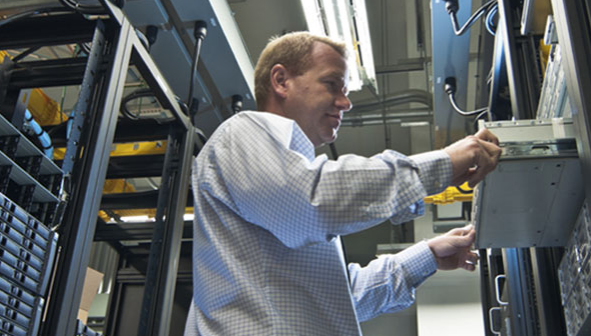Here’s a fun fact: The company that provides massive data storage drives for Hollywood movies like “The LEGO Movie 2” is located in tiny Elsmere, Delaware.
“Search for ‘ZeroWait Delaware’ on Google and then go to the Google Earth location of their office in Elsmere. On the roof you will see written ZeroWait. That is partly because its owner Mike Linett is a pilot and the roof is on an approach to the NCC/Wilmington Airport,” said IncNow President John Williams, who is working with Linett on a new blockchain project.
Linett founded ZeroWait, an on-site data storage provider, in Hockessin in 1989 — before most people were connected to the internet (then a closed, non-commercial network), a “portable” Macintosh was 16 pounds and cost $6,500, and the old black-and-white Game Boy was brand new.
A 1981 graduate of University of Delaware, he had various tech jobs in the ’80s before starting his own business: “I worked for a few companies from 1981 to ’85 as a programmer, inventory programming and things like that,” he said. The need for on-site data storage was relatively new, but it would grow dramatically.
ZeroWait has clients all over the world, including movie companies, gaming companies, mining companies and security camera storage for large retail spaces like the Valley Forge Mall.
“We used to think that a terabyte was a lot of data,” Linett said. “Now we sell multiple petabytes.” (For perspective, each petabyte is one million gigabytes.)
And, as storage becomes more affordable when it comes to phones and laptops, it’s also gotten more affordable as technology like digital animation evolves.
“Movies used to buy a terabyte for $600,000,” he said. “The newest LEGO movie uses 20 petabytes, each costing about $100,000.” The 2009 movie “Avatar,” with its “3D fusion technique,” came in at just over one petabyte — and it blew people’s minds.
It’s safe to say that by picking the network storage industry 30 years ago, Linett backed the right horse, but businesses don’t last on good ideas alone. It’s uncommon for any tech company to last as long as ZeroWait has, especially as technology evolves.
Linett’s words on how to sustain a company could apply to virtually any kind of successful business:
- “We listen to what our customers want us to do, and follow the 80/20 rule — that 80 percent of our business comes from 20 percent of our customers” (aka the Pareto principle).
- “We’ll try five new things a year; occasionally one of those things hits and hits big.”
- “Remember that every year you’ll lose 15 percent of your customers, but you’ll gain 15 percent in new ones” — if you’re doing it right, that is.
Treating employees well can help a business grow, too.
“If an engineer went to work for a movie company or a gaming company we would gain that company as a client,” Linett said, because that engineer left on good terms and recommended that their new employer hire their old.
And then there are the fun, personal touches that keep clients coming back. The B2B world can be cold, but Linett likes to tuck treats into packages for customers. Their trademark treat is boxes of Jelly Bellies.
“Back in 2002 or so we sent some of those ‘make-your-own’ M&Ms with your logo on them to a customer in India,” he said. “When they got there, they were like soup, so we switched to jelly beans.” Now, when he visits clients, he sees boxes of leftover Jelly Bellies in their offices.
As tech continues to evolve, Linett keeps his eye on new niches for the company. For instance, as blockchain becomes more and more common beyond Bitcoin, it needs more storage. Williams said he and Linett are exploring some legal tech ideas related to blockchain and the Series LLC.
“The riches,” Linett said, “are in the niches.”







